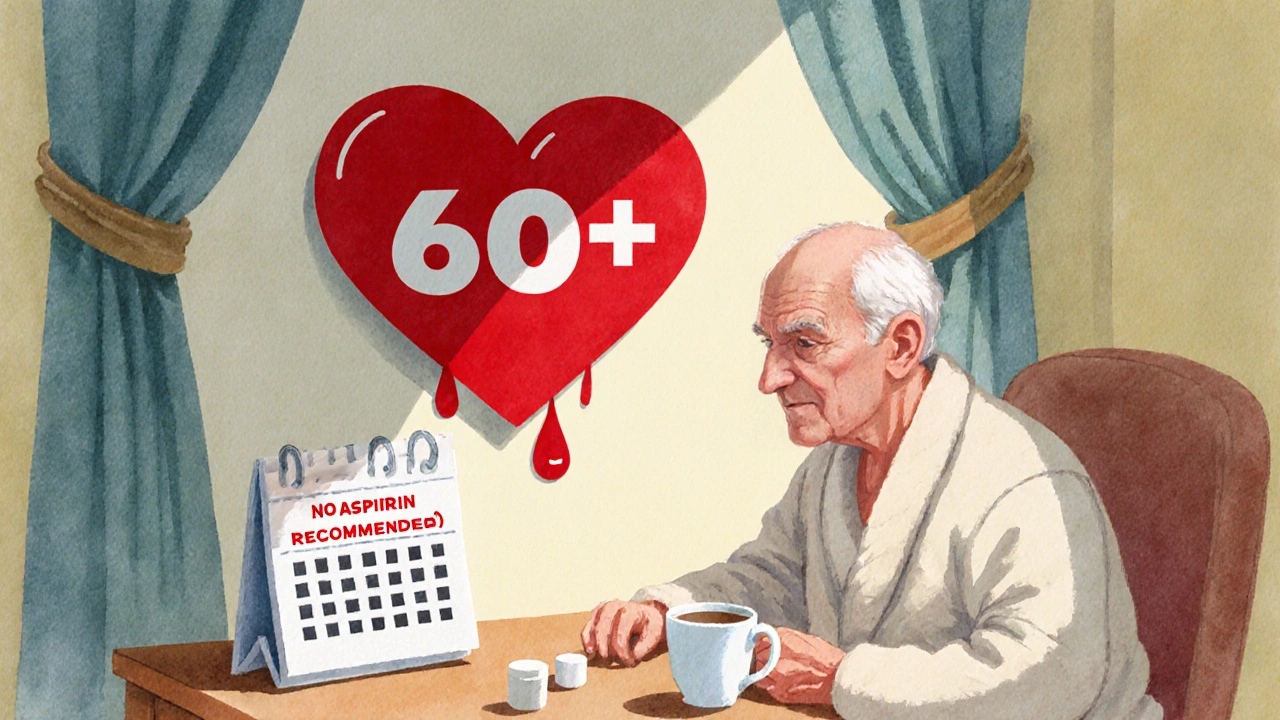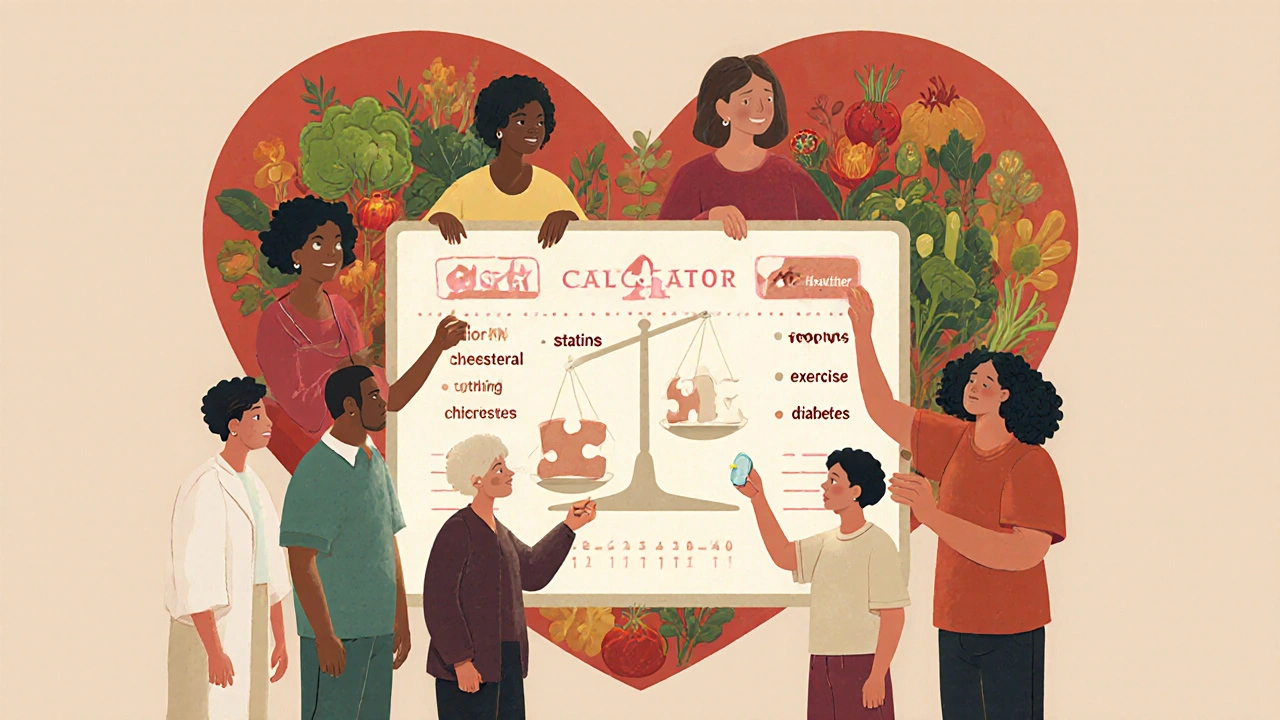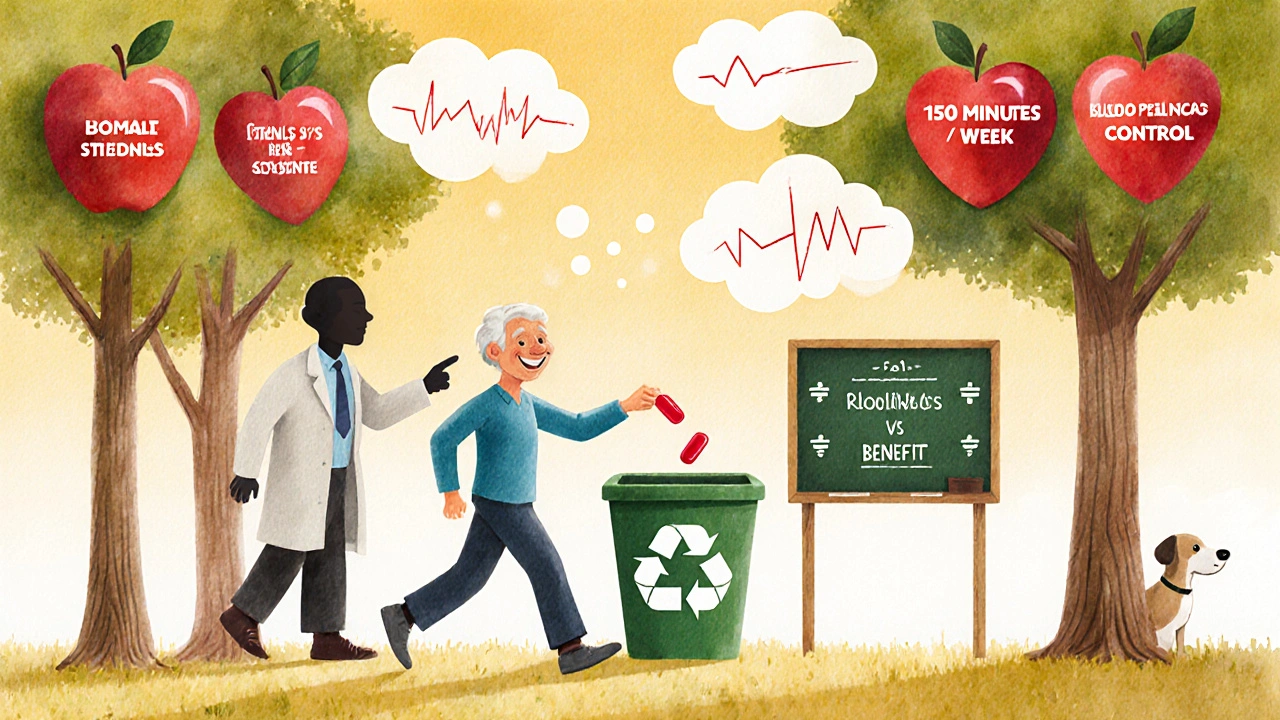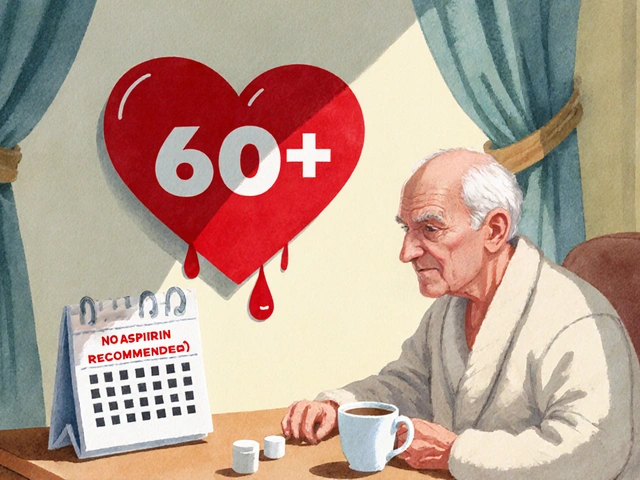12
Aspirin Therapy for Heart Disease Prevention: Who Should Take It in 2025?

For decades, taking a daily aspirin was as common as brushing your teeth if you wanted to avoid a heart attack. But those days are over. If you’re 60 or older and have never had a heart attack or stroke, aspirin therapy is no longer recommended for preventing heart disease - and in many cases, it could be doing more harm than good.
Why the Rules Changed
Aspirin works by thinning the blood. It stops platelets from clumping together and forming clots that can block arteries and cause heart attacks or strokes. For people who’ve already had a cardiovascular event, that’s life-saving. But for healthy people trying to prevent their first heart problem? The math has flipped.Large studies published since 2018 - like ASPREE, ASCEND, and ARRIVE - showed that while aspirin slightly lowers the risk of nonfatal heart attacks and strokes, it increases the chance of dangerous bleeding by about 43%. That includes bleeding in the stomach, brain, and intestines. For older adults, especially those over 60, the risk of bleeding often outweighs the tiny benefit.
Back in the 1980s and 90s, when people smoked more, ate worse, and didn’t take statins, aspirin made more sense. Today, with better control of blood pressure, cholesterol, and diabetes, the absolute benefit of aspirin has shrunk. One expert put it simply: “We now treat heart disease risk with statins and lifestyle changes. Aspirin doesn’t add enough to justify the bleeding risk.”
Who Might Still Benefit?
There’s still a small group where aspirin might be worth considering - but only after a detailed conversation with your doctor.Adults aged 40-59 with a 10% or higher 10-year risk of heart disease or stroke might be candidates. Your risk is calculated using a tool called the ACC/AHA Pooled Cohort Equation. It looks at:
- Your age, sex, and race
- Your total and HDL cholesterol levels
- Your blood pressure (whether treated or not)
- Whether you have diabetes
- Whether you smoke
If your calculated risk is 10% or more - and you don’t have a high bleeding risk - your doctor might suggest trying low-dose aspirin (75-100 mg daily). But it’s not automatic. It’s a personal choice.
People with type 2 diabetes are a special case. The American Diabetes Association says aspirin can be considered for those over 40 with additional risk factors - like high blood pressure, smoking, or a family history of heart disease. But again, only if bleeding risk is low.
Those with very high coronary artery calcium scores (a CT scan that shows plaque buildup in heart arteries) may also benefit. Some experts believe this group has such high risk that aspirin’s small benefit still tips the scale. But this isn’t standard advice yet - it’s still being studied.
Who Should Avoid Aspirin Completely?
If any of these apply to you, don’t start aspirin - and if you’re already taking it, talk to your doctor about stopping:- Age 60 or older - The U.S. Preventive Services Task Force says against starting aspirin for primary prevention in this group. The bleeding risk rises sharply after 60.
- History of stomach ulcers or GI bleeding - Aspirin irritates the stomach lining. Even low doses can cause serious bleeding.
- Taking blood thinners like warfarin, apixaban, or rivaroxaban - Combining these with aspirin multiplies bleeding risk.
- Heavy alcohol use - More than 3 drinks a day increases stomach bleeding risk.
- Severe kidney or liver disease - Your body can’t clear aspirin properly.
- Known aspirin allergy - Can cause breathing problems or severe skin reactions.
Doctors use a tool called HAS-BLED to assess bleeding risk. A score of 3 or higher means high risk - and aspirin is usually not recommended.

What About Family History?
“I’ve been taking aspirin because my dad had a heart attack at 58,” is one of the most common reasons people give for continuing aspirin. But family history alone isn’t enough to justify it.Having a parent with early heart disease raises your risk - but it doesn’t automatically mean you need aspirin. What matters more is your own risk factors: Do you smoke? Are your cholesterol and blood pressure under control? Do you have diabetes? If your personal risk is low, aspirin won’t help much - and could hurt you.
One 2019 study found that nearly 7 million Americans over 60 were still taking aspirin daily for prevention, even though they had no heart disease and no doctor’s recommendation. That’s not just outdated - it’s dangerous.
What’s the Right Dose?
If your doctor says aspirin is right for you, the dose is low - 75 to 100 mg per day. That’s one “baby aspirin.”Don’t take 325 mg unless specifically told to. Higher doses don’t give more protection - they just increase bleeding risk. And never take it on an empty stomach. Always take it with food or water to reduce stomach irritation.
What About Other Medications?
Statins are now the cornerstone of heart disease prevention. They lower LDL (“bad”) cholesterol by 30-50% - far more than aspirin can. Blood pressure meds, diabetes control, exercise, and a healthy diet do more to prevent heart attacks than aspirin ever did.Aspirin is not a substitute for these. It’s a potential add-on - and only for a very specific group.

What If You’re Already Taking It?
If you’re over 60 and taking aspirin daily for prevention - and you’ve never had a heart attack, stroke, stent, or bypass - talk to your doctor before stopping.Stopping aspirin suddenly isn’t dangerous for most people, but it’s still best to do it under medical guidance. Your doctor might suggest stopping if your bleeding risk is high or your heart risk is low.
Some people feel anxious about stopping. They worry they’ll “lose their protection.” But remember: the benefit was tiny to begin with. The risk of bleeding? Real and growing.
Alternatives to Aspirin
There’s no other pill that replaces aspirin for primary prevention. But there are better options:- Statins - For almost everyone with elevated cholesterol or diabetes, this is the #1 preventive tool.
- Blood pressure control - Keeping it under 120/80 reduces heart attack risk more than aspirin ever did.
- Exercise - Just 150 minutes a week of brisk walking cuts heart disease risk by 30%.
- Healthy diet - Focus on vegetables, whole grains, nuts, fish, and olive oil. Avoid processed meats and sugary drinks.
- Quitting smoking - This one change reduces heart attack risk by 50% within a year.
These aren’t just alternatives - they’re superior. They prevent heart disease at the source, not just by thinning the blood.
Bottom Line
Aspirin for heart disease prevention isn’t a one-size-fits-all solution anymore. For most people, especially those over 60, it’s no longer recommended. The bleeding risk is too high, and the benefit too small.For a small group - adults 40-59 with high heart risk and low bleeding risk - it might still be worth considering. But only after a full risk assessment and a thoughtful conversation with your doctor.
Don’t take aspirin just because you always have. Don’t stop it just because you read something online. Get your numbers checked. Know your risk. Make the decision together with your healthcare provider.
Heart health today isn’t about popping a pill. It’s about knowing your body, managing your risks, and choosing the right tools - not the old ones.
Should I take aspirin every day to prevent a heart attack if I’m healthy?
No - if you’re healthy and have never had a heart attack, stroke, or stent, daily aspirin is not recommended for prevention. For most people, especially over 60, the risk of serious bleeding outweighs the small chance of preventing a heart event. Talk to your doctor instead about statins, blood pressure control, and lifestyle changes.
What if my parent had a heart attack? Should I take aspirin?
Family history raises your risk, but it doesn’t mean you need aspirin. What matters more is your own health: your cholesterol, blood pressure, whether you smoke, and if you have diabetes. Your doctor will use a risk calculator to see if your 10-year heart disease risk is over 10%. Only then might aspirin be considered - and only if you don’t have bleeding risks.
Is 81 mg aspirin safe for everyone?
No. Even low-dose aspirin (81 mg) can cause stomach bleeding, brain bleeds, or worsen ulcers. It’s not safe if you have a history of GI bleeding, take blood thinners, drink heavily, have kidney or liver disease, or are over 60 without existing heart disease. Always check with your doctor before starting or continuing.
Can I take aspirin if I have diabetes?
For people with diabetes over 40 who have other risk factors (like high blood pressure or smoking), aspirin may be considered. But only if their bleeding risk is low. The American Diabetes Association says it’s an option - not a requirement. Your doctor will weigh your individual risks before recommending it.
What’s the best way to prevent heart disease without aspirin?
Focus on four proven strategies: 1) Take a statin if your cholesterol is high or you have diabetes; 2) Keep your blood pressure under 120/80; 3) Get 150 minutes of brisk walking or exercise each week; 4) Eat a diet rich in vegetables, whole grains, nuts, and fish. These work better than aspirin and don’t carry bleeding risks.









gent wood
November 14, 2025 AT 22:28Finally, someone put this in plain terms. I used to take aspirin daily because my dad had a heart attack at 57. Turns out, I never had a single risk factor - no high cholesterol, no hypertension, not even prediabetes. My doctor laughed when I brought it up. Said I was doing more harm than good. Stopped last year. No side effects. Felt better than ever.
Jane Johnson
November 16, 2025 AT 18:07While I appreciate the clinical data presented, one must consider the historical context of medical recommendations. Aspirin has been a cornerstone of preventive cardiology for over half a century. To discard it so casually, without acknowledging the psychological reassurance it provides to patients, is to ignore the human element of medicine.
Peter Aultman
November 16, 2025 AT 18:10Man I stopped my aspirin last year after reading this same stuff. No regrets. I started walking 30 minutes every morning and my blood pressure dropped 15 points. Statin's the real MVP here. Aspirin was just a habit I didn't need.
Sean Hwang
November 18, 2025 AT 01:42My uncle’s on blood thinners and still took aspirin for years. Ended up in the ER with a stomach bleed. Docs said it was 100% from mixing them. Don’t be that guy. Talk to your doctor. Don’t guess. It’s not worth it.
Barry Sanders
November 19, 2025 AT 07:117 million people taking aspirin for no reason? That’s not just dumb, that’s criminal negligence. Who’s prescribing this? Grandma’s GP? Some guy on YouTube? Wake up.
Chris Ashley
November 21, 2025 AT 01:44Wait so if I’m 55 and have diabetes but my BP is good and I don’t smoke, should I still take it? I’ve been doing it for 5 years. I don’t wanna stop if I don’t have to.
kshitij pandey
November 21, 2025 AT 20:11In India, many people still take aspirin daily because they believe it’s good for circulation. But we don’t have access to proper risk calculators or statins like in the US. This info is life-changing for us. Thank you for sharing.
Brittany C
November 22, 2025 AT 11:19It’s worth noting that the ACC/AHA Pooled Cohort Equation has significant limitations in diverse populations, particularly non-Caucasian and non-US cohorts. The 10% threshold may not be universally applicable. Precision medicine requires context.
Sean Evans
November 23, 2025 AT 17:57So you’re telling me I’ve been wasting $50 a year on baby aspirin for 10 years? 😭 I’m not even mad. I’m just… disappointed. Like I got scammed by my own anxiety. Also, my dentist said aspirin was killing my gums. Guess I’m not the only one who’s been lied to.
Anjan Patel
November 24, 2025 AT 13:37Aspirin is the symbol of lazy prevention. You want to avoid heart disease? Stop eating fried food. Stop sitting. Stop drinking soda. Stop pretending a pill can fix your lifestyle. The system wants you dependent. Don’t be fooled.
Scarlett Walker
November 26, 2025 AT 03:51I was so scared to stop. I thought I’d have a heart attack tomorrow. But I did it. Walked every day. Got my cholesterol checked. My doc said my risk is now 4%. I feel like I finally took control.
Hrudananda Rath
November 26, 2025 AT 20:26It is a matter of profound regret that the general populace continues to place undue faith in pharmacological panaceas, when the true pillars of cardiovascular health - disciplined dietary regimen, consistent physical exertion, and psychological equilibrium - remain woefully neglected. The erosion of personal responsibility in healthcare is a societal tragedy.
Brian Bell
November 28, 2025 AT 12:04My grandma’s 78 and still takes aspirin. I told her to stop. She said, ‘But it’s been my routine since ’98!’ I printed out the USPSTF guidelines and showed her. She cried. Then she called her doctor. Best decision she ever made.
Nathan Hsu
November 29, 2025 AT 12:55Family history matters, yes - but only as a trigger for deeper investigation. My father had a triple bypass at 52. I got a CAC scan. Score: 890. My doctor said, ‘You’re in the top 1% of risk.’ So yes - I’m on aspirin. But only because the scan said so. Not because of tradition.